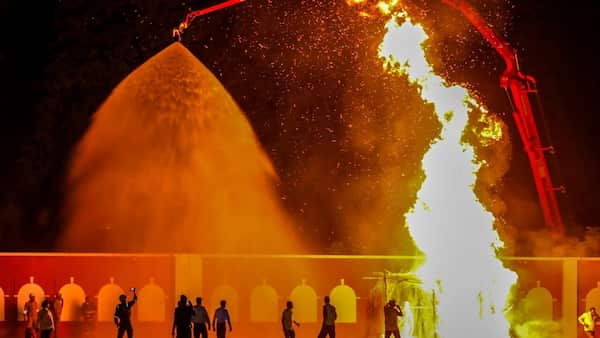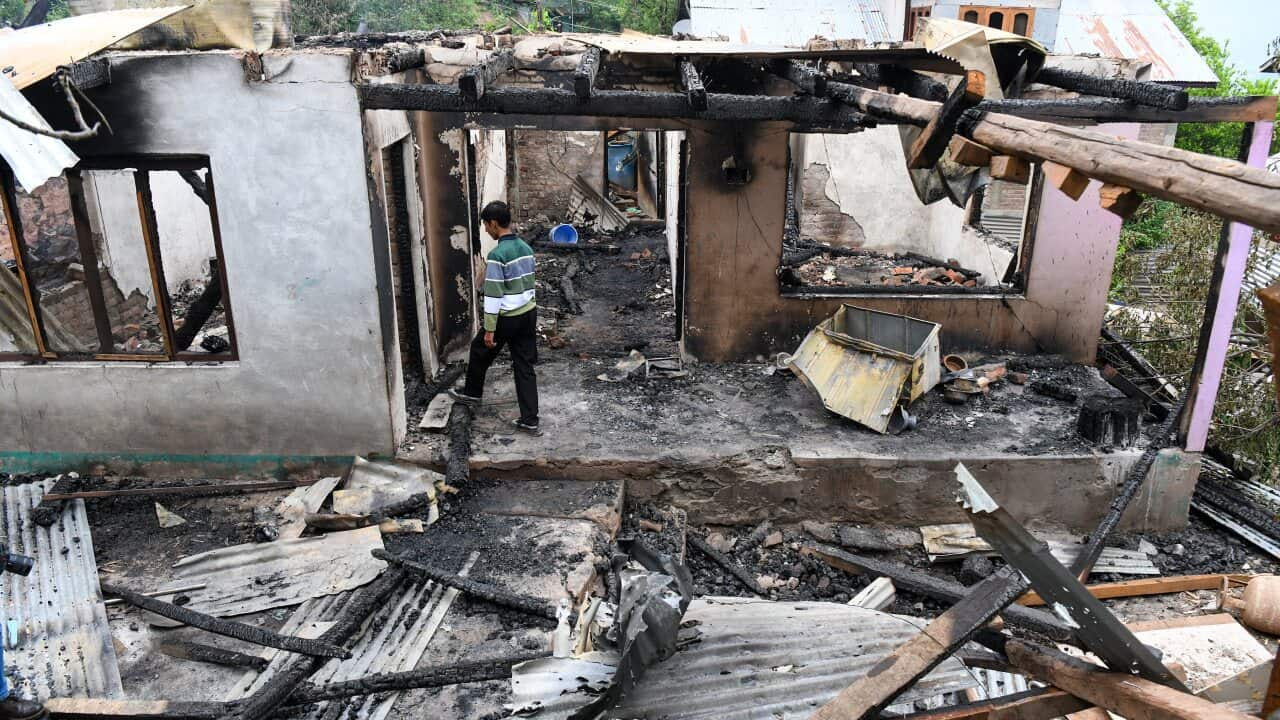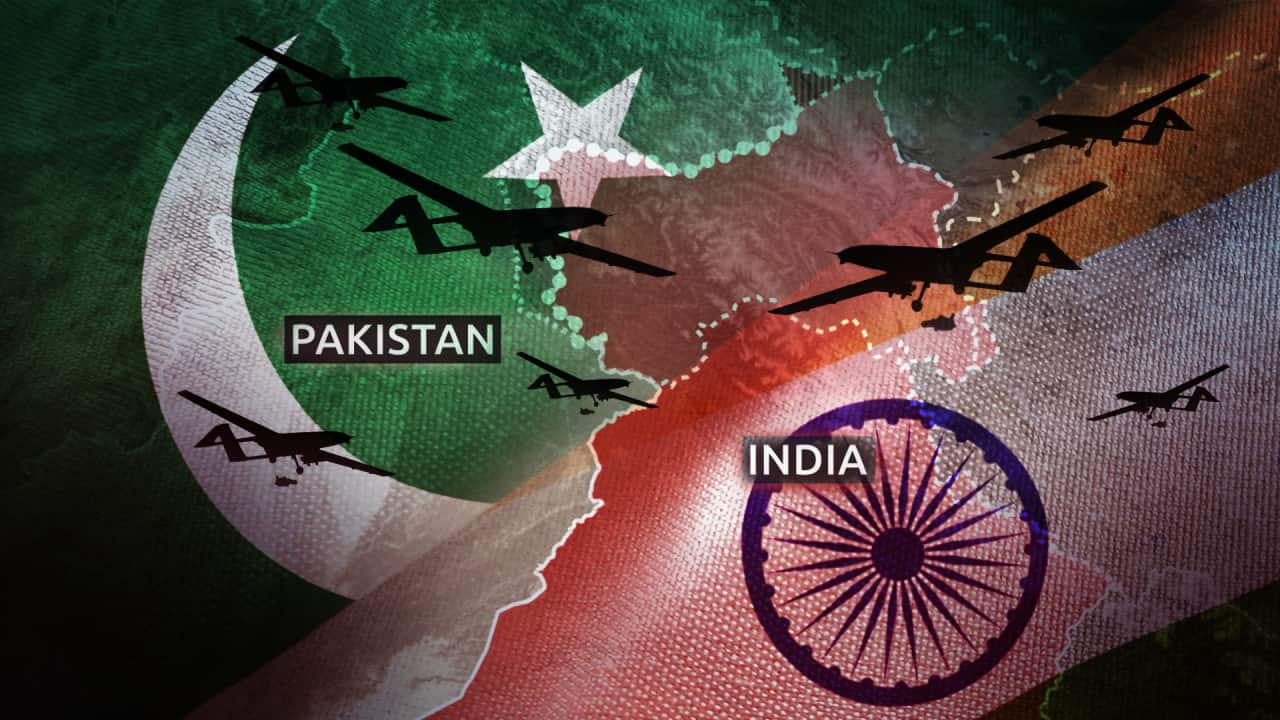Key Points
- India says Pakistani drones caused explosions over Jammu on Thursday.
- Two days of fighting have killed nearly four dozen people in the Kashmir region.
- With blackouts and active defences reported, the US, Russia and China are urging restraint as tensions escalate.
United States vice president JD Vance has said India and Pakistan should de-escalate tensions after a second day of clashes between the nuclear-armed neighbours — but he added that a war between the South Asian neighbours would be "none of our business".
Sirens sounded and red flashes and projectiles erupted in the night sky above Jammu near Indian-administered Kashmir for around two hours on Thursday, a Reuters journalist said, in what appeared to be an escalation in the countries' worst confrontation in more than two decades.
Two days of fighting have killed nearly four dozen people.
India's defence ministry said locations in and near the federal territory of Jammu and Kashmir had been struck, but said "threats were swiftly neutralised" and "no casualties or material losses were reported".
While Pakistan has not officially commented on the strikes in Jammu, its defence minister, Khawaja Muhammad Asif, warned earlier that further retaliation was "increasingly certain" following what Pakistan described as Indian disinformation and aggression.
Indian TV channels also showed flares and flashes in the sky above Jaisalmer city in Rajasthan state, which shares a border with the southern Pakistani province of Sindh.
In a statement, Pakistan denied attacking Pathankot in India's Punjab state, Srinagar in the Kashmir valley and Jaisalmer and said the accusations were "entirely unfounded, politically motivated, and part of a reckless propaganda campaign aimed at maligning Pakistan".
Pakistan's foreign affairs ministry said the country would respond to any escalation "with full resolve and determination to safeguard Pakistan's sovereignty and territorial integrity".
'Operation Sindoor'
On Wednesday, Indian forces struck and Pakistan-administered Kashmir as part of 'Operation Sindoor'.
India maintains its actions were a "measured" and "non-escalatory" response to on Hindu tourists in Pahalgam, which it claims was backed by Pakistani-based militants. Pakistan has denied involvement in the Pahalgam attack.
Indian ambassador to the United States Vinay Kwatra told CNN the strikes were intended to deliver a "certain finality" while avoiding broader military escalation.
Pakistan said the Indian strikes hit civilian areas, not militant infrastructure, and claimed to have shot down five Indian warplanes, including French-made Rafale jets, and 29 drones in retaliation, while reporting the deaths of 40 to 50 Indian troops along the Line of Control.
These figures remain unverified. India has rejected previous Pakistani claims as "misinformation" and has not publicly confirmed aircraft losses or casualties.
As night fell, blackouts were reported in parts of Indian Punjab, Kashmir and Rajasthan, adding to residents' anxiety.
Police in Pathankot and army sources confirmed active air defences were engaged in intercepting further Pakistani drones and missiles.
A senior US official said American intelligence assessed at least one Indian fighter jet was downed by Pakistan during the exchange.
LISTEN TO

INTERVIEW: The conflict in Kashmir
SBS News
05:08
'None of our business'
Officials from the US, Russia and China have all urged restraint following the latest round of violence.
In a Fox News interview on Thursday, Vance said: "We want this thing to de-escalate as quickly as possible. We can't control these countries, though."
"What we can do is try to encourage these folks to de-escalate a little bit, but we're not going to get involved in the middle of war that's fundamentally none of our business and has nothing to do with America's ability to control it," he said.
"Our hope and our expectation is that this is not going to spiral into a broader regional war or, God forbid, a nuclear conflict."
LISTEN TO

World leaders urge restraint as tensions continue to escalate between India and Pakistan
SBS News
07:35
India is an important partner for the US, which aims to counter China's rising influence, while Pakistan remains a US ally despite its diminished importance after US's withdrawal from neighbouring Afghanistan in 2021.
The US has held regular talks with both in recent days, including on Thursday when secretary of state Marco Rubio held calls with Pakistan's prime minister and India's foreign minister while urging them to de-escalate and have direct dialogue.
US President Donald Trump called rising tensions a shame. On Wednesday, he said he hoped the two countries will stop now after going "tit-for-tat". The state department urged both countries to work towards what the US termed a "responsible solution".
The relationship between India and Pakistan has been fraught with tension since they gained independence from colonial Britain in 1947. The countries have fought three wars, two of them over Kashmir, and clashed many times.
The neighbours, which both claim Kashmir in full and rule over parts of it, separately acquired nuclear weapons in the 1990s.


